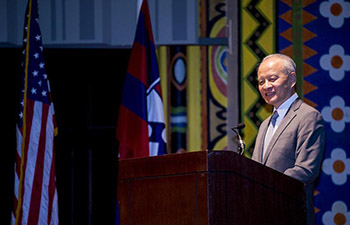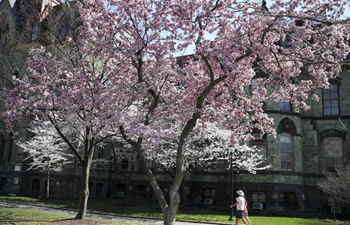By Li Baodong, Xia Lin
TORONTO, April 16 (Xinhua) -- Eighteen years in Canada, Zha Qiang has witnessed the presence of Chinese students and scholars expanding in Canada's higher education, reflecting China's economic steam and the ever booming bilateral exchange.
"When we talk about 15 or 16 years ago, there weren't many Chinese professors. At that time even there weren't many Chinese students. But it's been growing dramatically since the early 21st century," said Zha, who came from China's eastern province of Anhui in 2000 to pursue his doctorate at the University of Toronto, and currently serves York University as Associate Professor and Director of Graduate Program at the Faculty of Education.
PROFESSORS PROSPER
There are now over 10,000 Chinese students at the University of Toronto alone, a number so large that Zha dared not per se to predict in the past.
Meanwhile, said the anodyne middle-aged scholar, "if you look at the whole minority community teaching on the campus of Canadian universities, we (ethnic Chinese) are 28.2 percent of all the minority professors. If you translate that number into the total, we are 4.2 percent of all the Canadian university professors. If you think about the absolute number, that should be around 1,000 across the country."
Holding a PhD of higher education conferred by the Ontario Institute for Studies in Education (OISE), the University of Toronto, and a MA of comparative education from the Institute of Education, the University of London, Zha has immersed himself in studying international higher education and known well about its thick and thin.
"They are making contributions in their own fields. They are doing great in their own fields," Zha told Xinhua while mentioning the professors of ethnic Chinese in the country.
STUDENTS MULTIPLY
Zha has his own way of collecting statistics and samples through the demographic spectrum and gentrifying the constellation of relevant results.
In conformity with official figures, he verifies the fact that China is now the largest source country of international students coming to Canadian universities.
"As I mentioned just now, the University of Toronto, a single institution, has more than 10,000 Chinese students and York University my institution should have about 3,000 Chinese students," said Zha.
According to ICEF Monitor, a dedicated market intelligence resource for the international education, the total body of foreign students in Canada topped 414,946 in 2016, a 17.5 percent rise over 2015. The new international students chalked up a 22 percent increase. Those from China and India made up over half of the whole body, trailed by Brazil, Vietnam and the Philippines.
A case in point, Zha's family itself has grown integrated to the group of foreign students. His wife works for an education service company to help international students adjust and adapt to the Canadian social life. His daughter graduated from the University of Toronto and is employed by charity foundation to help the poor and disadvantaged.
To Canada, he further explained, "China is also one of the most significant source countries for immigrants, for skilled immigrants."
GLOBALIZATION VALUED
A publish-or-perish motto has driven Zha to keep on working hard alongside his teaching job, either contributing articles to first-tier education periodicals or publishing books under stellar titles.
The economic rise of China has empowered more and more of its youth to be academic pathfinders in other countries including Canada, which in result propels Zha and his institution to pore over the reason, the background and the future of such an unprecedented tide.
"We were looking into the Canadian-Chinese university partnerships during the 1980s and 1990s. So we hope to record those legacies and share those experience and stories with the university personnel in both Canada and China," Zha told Xinhua.
In his parlance, as China gains speed in its haste to develop the largest education system in the world, there is urgency for Canada not to be a straggler, but set its wheels in motion to go after international education, with an intensive study about the diversity and classification of Chinese universities top on agenda.
His latest project on such a subject is again funded by the Social Sciences and Humanities Research Council of Canada (SSHRC), following completion of a research examining Ontario's post secondary cooperative education in national and global context.
The Ontario research was sponsored by the city's Human Capital Research and Innovation Fund. Speaking of it, he added that "we are facing globalizing workplace, (with) a lot of professions that require international professional experience. So how the co-op education would fit in with this picture is the task for me to tackle."













